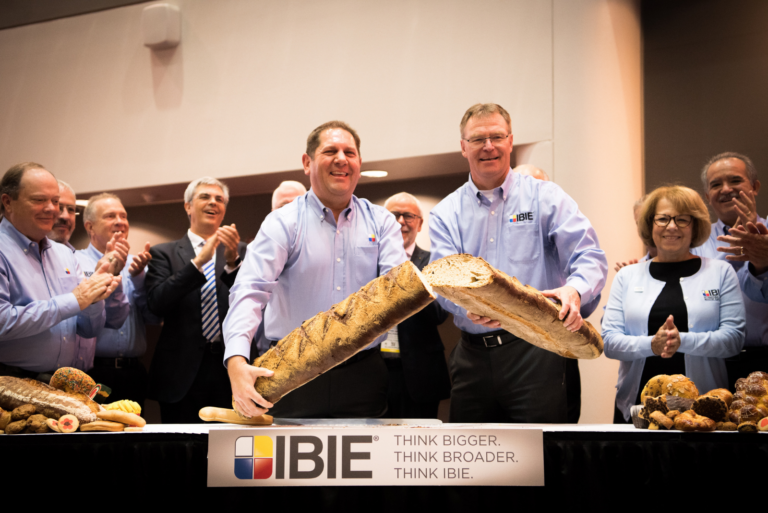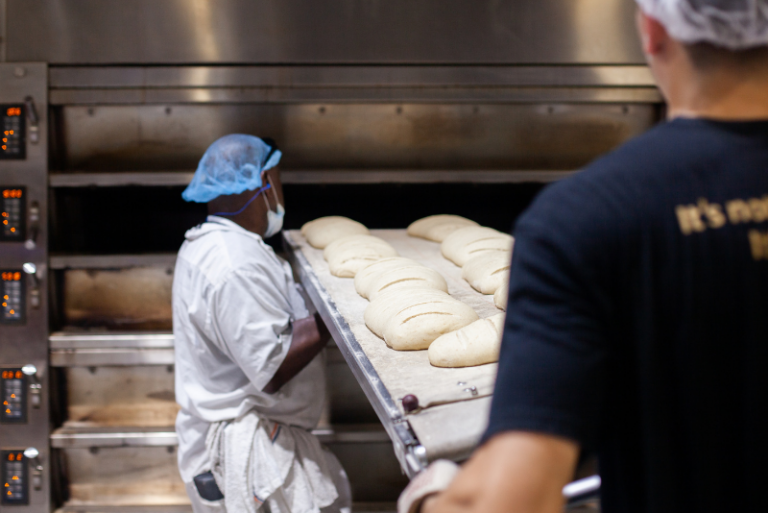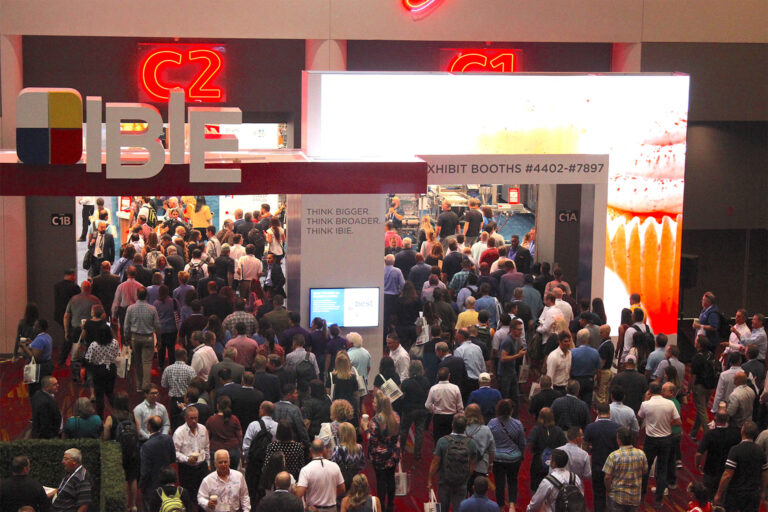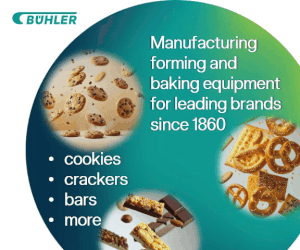After all the change that’s occurred since IBIE 2019, are there any predictions on what capital expenditures will look like for 2022-23?
 Joseph Turano: Companies are looking at capital expenditures on a two- or three-year horizon now because the lead times are so long for most equipment. The show’s timing is great because most of our industry is looking at major projects two, three, even four years out. IBIE will be perfectly timed for the 2023-2024 installations.
Joseph Turano: Companies are looking at capital expenditures on a two- or three-year horizon now because the lead times are so long for most equipment. The show’s timing is great because most of our industry is looking at major projects two, three, even four years out. IBIE will be perfectly timed for the 2023-2024 installations.
 Jorge Zarate: CapEx for most companies will continue to expand, and that’s because our markets are growing — first due to the pandemic, now due to the changes in consumer behaviors that are directly impacting the baking industry.
Jorge Zarate: CapEx for most companies will continue to expand, and that’s because our markets are growing — first due to the pandemic, now due to the changes in consumer behaviors that are directly impacting the baking industry.
 David Watson: Agreed. CapEx is going to be up because of the labor shortages and automation. Virtually every project I’m working on seems to be associated with reduced labor, automation and productivity. Some customers have lowered their return requirements on major projects. Customers are doing a lot of the investment to reduce labor because they know that the labor shortage isn’t going to go away anytime soon. It could be a long-term challenge.
David Watson: Agreed. CapEx is going to be up because of the labor shortages and automation. Virtually every project I’m working on seems to be associated with reduced labor, automation and productivity. Some customers have lowered their return requirements on major projects. Customers are doing a lot of the investment to reduce labor because they know that the labor shortage isn’t going to go away anytime soon. It could be a long-term challenge.
Gunnell: A lot of the projects we’re working on … people want installations right away, but they’ve come to realize ‘right away’ is not going to happen these days. It’s six, nine or even 12 months for a project that used to take three-to-five months. That’s the reality. But in the past where they might have said, ‘We’re not doing it if it’s a year out,’ now they’re saying, ‘We better get in line, or it’s going to be 18 months.’
Are supply chain bottlenecks and shipping issues the reason that projects are not able to ramp up as quickly?
Turano: Yes. Plus, the fact that most companies on the manufacturing side and fabrication side seem to be backlogged because of the COVID year and the lack of time spent at their businesses. The industry is a little bit fragmented right now. On the baking side, at least domestically, you have several companies who are in aggressive growth mode and looking to make the expansions and capital investments. Then there are many companies in our industry still recovering from the COVID crisis. The next year — from now until the show — will be very telling to see how the industry shakes out. Hopefully it will be healthy and solid moving forward; the timing of the show should be very beneficial.
Any thoughts on what will be the most sought-after technologies at IBIE 2022? What will be the overarching exhibitor themes?
Zarate: Baking companies in general will search for updated technology, automation through robotics, IIoT, equipment sanitary designs to enhance COVID-19 protocols, and equipment with sustainable designs and minimized carbon footprint. Exhibitors will be matching these needs.
Turano: The two main ones that will be prevalent and most sought-after will be packaging automation due to the labor challenges, and on the ingredients side, it will be the movement toward non-GMO.
Gunnell: We’re going to have two new pavilions, one focused on cannabis in bakery and the other on food sanitation. But we also need to look outside of our industry and toward others for solutions.
I know retail is a growing sector for bakers. What can they look forward to seeing next year?
Cornelis: There’s going to be a lot to offer artisan and retail bakers. They’re also excited to get back out, go to the demos and see the celebrity bakers. We’ve got a great slate of speakers, which I can’t tell you about just yet. But I can say it’s going to be one of our best shows ever.
Committee members not on the call include Jason Frye, senior VP, supply chain planning and performance, Flowers Foods; and Kim Albers-Nisbet, president of sales, United States Bakery.
This is an excerpt from a larger story on exclusive IBIE perspectives from Commercial Baking’s Innovations Annual. The full story can be viewed here.

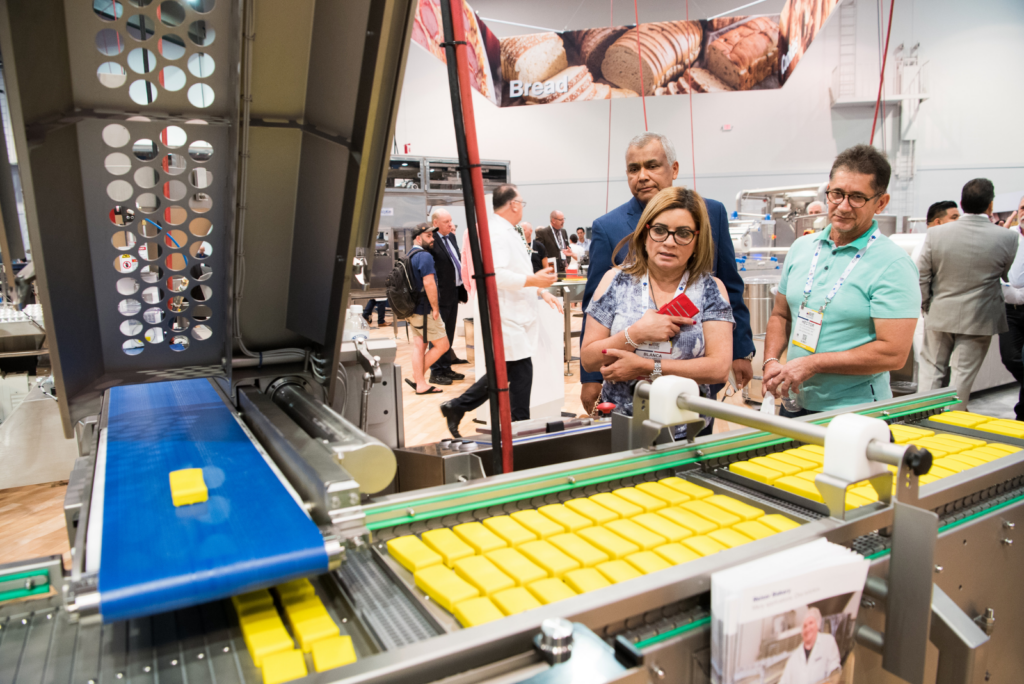
 Michael Cornelis: From the wholesale bakery perspective, IBIEducate will address the ever-changing role of the bakery engineer. Because bakers are adding more automation and using less manpower, the bakery engineer has got to be an automation expert now. Or you need to have a few automation experts at every location as plants get more and more automated. That’s where IBIEducate can be a great resource through programming for our baker attendees.
Michael Cornelis: From the wholesale bakery perspective, IBIEducate will address the ever-changing role of the bakery engineer. Because bakers are adding more automation and using less manpower, the bakery engineer has got to be an automation expert now. Or you need to have a few automation experts at every location as plants get more and more automated. That’s where IBIEducate can be a great resource through programming for our baker attendees. Ken Newsome: There was this big surge and change in demand in terms of more home-based eating vs. outside the home. A lot of people expected that to be a blip and to go away. What bakers are finding is that it’s not going away as they had expected. Demand has fundamentally changed. We want to help bakers figure out how to run their operations in a post-COVID world where it’s harder to get workers. It’s also riskier to have people standing near each other doing tasks. You’ll see a focus on that at the show.
Ken Newsome: There was this big surge and change in demand in terms of more home-based eating vs. outside the home. A lot of people expected that to be a blip and to go away. What bakers are finding is that it’s not going away as they had expected. Demand has fundamentally changed. We want to help bakers figure out how to run their operations in a post-COVID world where it’s harder to get workers. It’s also riskier to have people standing near each other doing tasks. You’ll see a focus on that at the show. Dennis Gunnell: As an exhibitor, we will be focusing heavily on dealing with labor shortage through automation, equipment, the way we handle ingredients, the way product is handled after it’s made, and through trucking and logistics. What baking engineers are looking at has to be rethought around fewer people and more automation. It’s a fact of life that we all are dealing with in our businesses. That will be a big theme of this show, and we’ll address it in every aspect of the education and exhibits.
Dennis Gunnell: As an exhibitor, we will be focusing heavily on dealing with labor shortage through automation, equipment, the way we handle ingredients, the way product is handled after it’s made, and through trucking and logistics. What baking engineers are looking at has to be rethought around fewer people and more automation. It’s a fact of life that we all are dealing with in our businesses. That will be a big theme of this show, and we’ll address it in every aspect of the education and exhibits. Joseph Turano: Companies are looking at capital expenditures on a two- or three-year horizon now because the lead times are so long for most equipment. The show’s timing is great because most of our industry is looking at major projects two, three, even four years out. IBIE will be perfectly timed for the 2023-2024 installations.
Joseph Turano: Companies are looking at capital expenditures on a two- or three-year horizon now because the lead times are so long for most equipment. The show’s timing is great because most of our industry is looking at major projects two, three, even four years out. IBIE will be perfectly timed for the 2023-2024 installations. Jorge Zarate: CapEx for most companies will continue to expand, and that’s because our markets are growing — first due to the pandemic, now due to the changes in consumer behaviors that are directly impacting the baking industry.
Jorge Zarate: CapEx for most companies will continue to expand, and that’s because our markets are growing — first due to the pandemic, now due to the changes in consumer behaviors that are directly impacting the baking industry. David Watson: Agreed. CapEx is going to be up because of the labor shortages and automation. Virtually every project I’m working on seems to be associated with reduced labor, automation and productivity. Some customers have lowered their return requirements on major projects. Customers are doing a lot of the investment to reduce labor because they know that the labor shortage isn’t going to go away anytime soon. It could be a long-term challenge.
David Watson: Agreed. CapEx is going to be up because of the labor shortages and automation. Virtually every project I’m working on seems to be associated with reduced labor, automation and productivity. Some customers have lowered their return requirements on major projects. Customers are doing a lot of the investment to reduce labor because they know that the labor shortage isn’t going to go away anytime soon. It could be a long-term challenge.